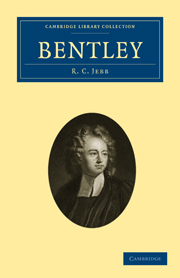Book contents
- Frontmatter
- PREFATORY NOTE
- Contents
- CHAPTER I EARLY LIFE. THE LETTER TO MILL
- CHAPTER II THE BOYLE LECTURES
- CHAPTER III LEARNED CORRESPONDENCE. THE KING'S LIBRARIAN
- CHAPTER IV THE CONTROVERSY ON THE LETTERS OF PHALARIS
- CHAPTER V BENTLEY'S DISSERTATION
- CHAPTER VI TRINITY COLLEGE, CAMBRIDGE
- CHAPTER VII BENTLEY AS MASTER OF TRINITY
- CHAPTER VIII LITERARY WORK AFTER 1700.—HORACE
- CHAPTER IX OTHER CLASSICAL STUDIES. — TERENCE. — MANILIUS. — HOMER
- CHAPTER X THE PROPOSED EDITION OF THE NEW TESTAMENT
- CHAPTER XI ENGLISH STYLE. EDITION OF PARADISE LOST
- CHAPTER XII DOMESTIC LIFE. LAST YEARS
- CHAPTER XIII BENTLEY'S PLACE IN THE HISTORY OF SCHOLARSHIP
CHAPTER VII - BENTLEY AS MASTER OF TRINITY
Published online by Cambridge University Press: 07 September 2010
- Frontmatter
- PREFATORY NOTE
- Contents
- CHAPTER I EARLY LIFE. THE LETTER TO MILL
- CHAPTER II THE BOYLE LECTURES
- CHAPTER III LEARNED CORRESPONDENCE. THE KING'S LIBRARIAN
- CHAPTER IV THE CONTROVERSY ON THE LETTERS OF PHALARIS
- CHAPTER V BENTLEY'S DISSERTATION
- CHAPTER VI TRINITY COLLEGE, CAMBRIDGE
- CHAPTER VII BENTLEY AS MASTER OF TRINITY
- CHAPTER VIII LITERARY WORK AFTER 1700.—HORACE
- CHAPTER IX OTHER CLASSICAL STUDIES. — TERENCE. — MANILIUS. — HOMER
- CHAPTER X THE PROPOSED EDITION OF THE NEW TESTAMENT
- CHAPTER XI ENGLISH STYLE. EDITION OF PARADISE LOST
- CHAPTER XII DOMESTIC LIFE. LAST YEARS
- CHAPTER XIII BENTLEY'S PLACE IN THE HISTORY OF SCHOLARSHIP
Summary
When Bentley entered on his new office, he was in one of those positions where a great deal may depend on the impression made at starting. He did not begin very happily. One of his first acts was to demand part of a College dividend due by usage to his predecessor, Dr Mountague, who closed the discussion by waiving his claim. Then the Master's Lodge required repairs, and the Seniority (the eight Senior Fellows) had voted a sum for that purpose, but the works were executed in a manner which ultimately cost about four times the amount. It is easy to imagine the comments and comparisons to which such things would give rise in a society not, perhaps, too favourably prepossessed towards their new chief. But Bentley's first year at Trinity is marked by at least one event altogether fortunate, —his marriage. At Bishop Stillingfleet's house he had met Miss Joanna Bernard, daughter of Sir John Bernard, of Brampton, Huntingdonshire. ‘Being now raised to a station of dignity and consequence, he succeeded in obtaining the object of his affections, ’ says Dr Monk—who refuses to believe a story that the engagement was nearly broken off owing to a doubt expressed by Bentley with regard to the authority of the Book of Daniel. Whiston has told us what this alleged doubt was. Nebuchadnezzar's golden image is described as sixty cubits high and six cubits broad; now, said Bentley, this is out of all pro. portion; it ought to have been ten cubits broad at least; ‘Which made the good lady weep.’ The lovers’ difference was possibly arranged on the basis suggested by Whiston, —that the sixty cubits included the pedestal.
- Type
- Chapter
- Information
- Bentley , pp. 97 - 123Publisher: Cambridge University PressPrint publication year: 2010First published in: 1882



